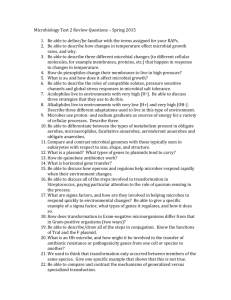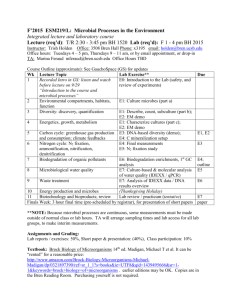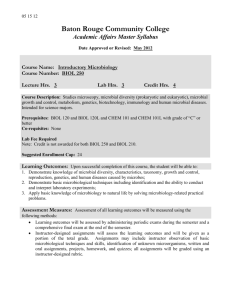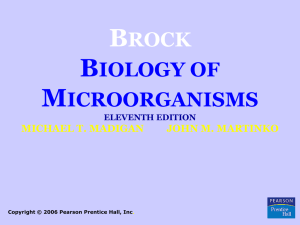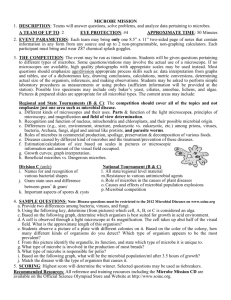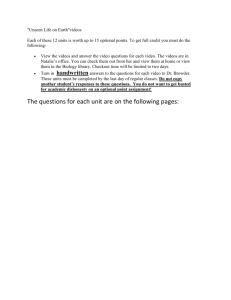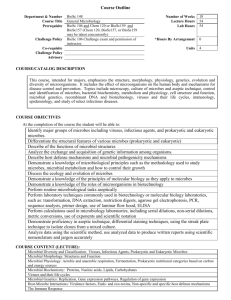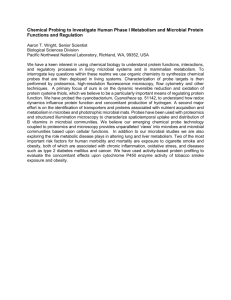Active IAI Code (024) School Code MCROBIO 233
advertisement
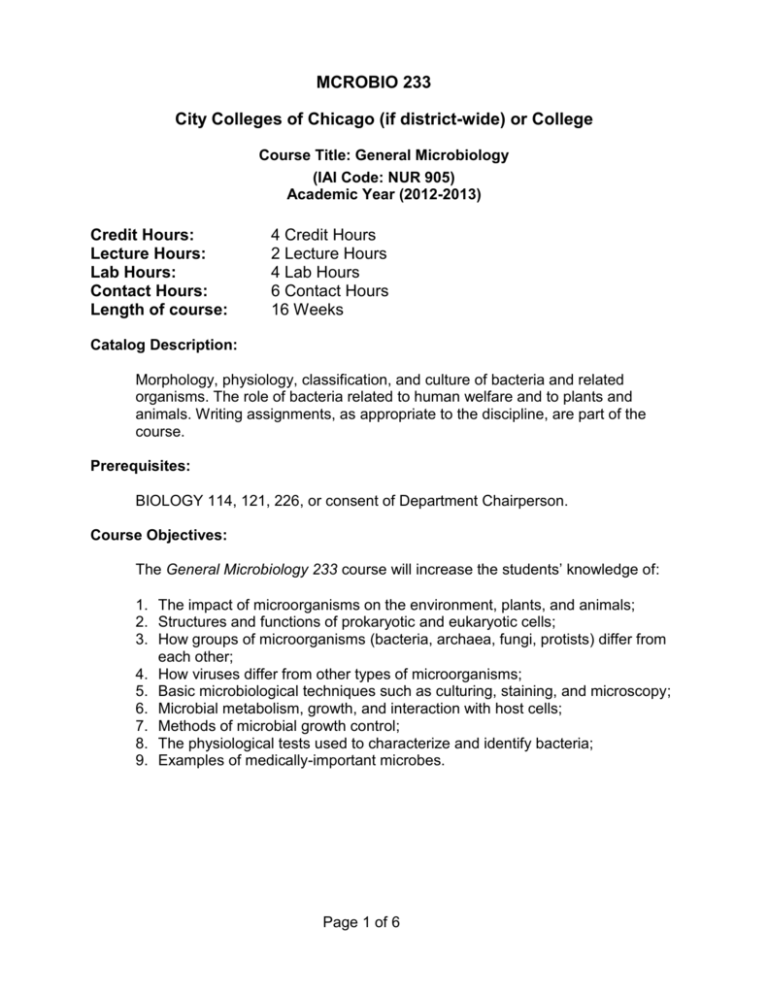
MCROBIO 233 City Colleges of Chicago (if district-wide) or College Course Title: General Microbiology (IAI Code: NUR 905) Academic Year (2012-2013) Credit Hours: Lecture Hours: Lab Hours: Contact Hours: Length of course: 4 Credit Hours 2 Lecture Hours 4 Lab Hours 6 Contact Hours 16 Weeks Catalog Description: Morphology, physiology, classification, and culture of bacteria and related organisms. The role of bacteria related to human welfare and to plants and animals. Writing assignments, as appropriate to the discipline, are part of the course. Prerequisites: BIOLOGY 114, 121, 226, or consent of Department Chairperson. Course Objectives: The General Microbiology 233 course will increase the students’ knowledge of: 1. The impact of microorganisms on the environment, plants, and animals; 2. Structures and functions of prokaryotic and eukaryotic cells; 3. How groups of microorganisms (bacteria, archaea, fungi, protists) differ from each other; 4. How viruses differ from other types of microorganisms; 5. Basic microbiological techniques such as culturing, staining, and microscopy; 6. Microbial metabolism, growth, and interaction with host cells; 7. Methods of microbial growth control; 8. The physiological tests used to characterize and identify bacteria; 9. Examples of medically-important microbes. Page 1 of 6 Student Learning Outcomes: Upon satisfactory completion of the course, students will be able to: A. Evaluate the impact of microorganisms on the environment, plants, and animals; B. Compare prokaryotic and eukaryotic cells; C. Identify features which define major groups of microorganisms; D. Contrast viruses with other types of microorganisms; E. Initiate cultures of microorganisms using aseptic technique F. Differentiate between types of microbes by employing staining and microscopy techniques G. Explain the catabolic and anabolic reactions involved in microbial metabolism H. Test conditions of microbial growth and methods of growth control I. Analyze test results to identify an unknown bacterial species J. Give examples of species which cause infectious disease in humans Topical Outline: I. Introduction to Microbes a. Types of Microbes b. Microbial Roles in the Environment c. Microbial Impact on Plants and Animals II. The Chemistry of Biology III. Survey of Microbes a. Prokaryotic Microbes (Bacteria, Archaea) b. Eukaryotic Microbes (Fungi, Protists, Helminths) c. Viruses IV. Introduction to Microscopy, Aseptic Technique, and Staining V. Medically-Important Gram-Positive Bacilli VI. Microbial Reproduction and Metabolism VII. Identification of Unknown Bacteria VIII. Methods of Microbial Growth Control IX. Medically-Important Cocci X. Medically-Important Gram-Negative Bacilli Students the Course is Expected to Serve: Students may take this course to meet concentration or elective requirements for an associates degree, to fulfill requirements for a career occupational degree, or to prepare for other careers in the biological sciences or healthcare professions. Page 2 of 6 Recommended Methods of Instruction: D - Discussion/Lecture X - Lab/Lab Discussion O - Online activities G - Groupwork Recommended Methods of Evaluation: Objective Tests Essays Homework Project(s) Summative Final Examination Recommended Textbooks: 1. Talaro, Kathleen P. Foundations in Microbiology. 7th Edition. McGraw-Hill, 2009. ISBN: 0073375225. 2. Chess, Barry. Laboratory Applications in Microbiology: A Case Study Approach. McGraw-Hill, 2009. ISBN: 007337525X Recommended Supplies/Supplementary Materials: 1. 2. 3. 4. Long-sleeved lab coat Goggles with UV protection Three-ring binder (at least one inch) 10 index dividers (or 10 index tabs with a table of contents) to make the following sections: course schedule, syllabus & safety, text notes, class notes, pre-labs, labs, writing assignments, exam notes, unknown project, optional assignments 5. Notebook paper, a notebook with perforated three-hole punched pages, or Cornell note-taking paper (can be printed from http://eleven21.com/notetaker/) Labs (if applicable): (For science labs, complete and attach the IAI General Education Physical/Life Science Lab Submission Form available at http://www.itransfer.org/iai/fact/forms/GECC%20Science%20Lab%20Form%2011.pdf Page 3 of 6 ADDENDUM FOR INDIVIDUAL INSTRUCTOR COURSE SYLLABUS The following items are found in the individual instructor course syllabus. In the instructor syllabus, include the required information supplied in the master course syllabus (above). Add a calendar, grading policies, and other information related to your class requirements, along with CCC policies and federal statutes (e.g., FERPA and ADA). You may also include any relevant information, e.g. additional reading materials and assessment methods. See examples below. NOTE: For IAI submissions, provide a master syllabus and an instructor syllabus. Include an IAI Gen. Ed. Submission for Physical/Life Science labs. Calendar: Week Topic(s) Lab Exercises 1 Course Orientation, Knowledge Probe Introduction to Microbes and Disease Safety Considerations Simulated Epidemic 2 Introduction to Microbes and Disease The Chemistry of Biology Simulated Epidemic Microscopy 3 Prokaryotic Microbes, Helpful Bacteria Ubiquity of Bacteria 4 Prokaryotic Microbes, Harmful Bacteria EXAM 1 Ubiquity of Bacteria 5 Eukaryotic Microbes Eukaryotic Microbes ESSAY 1 DUE Medically-Important Fungi Medically-Important Protist 6 Introduction to Viruses Microbial Growth Aseptic Techniques 7 Microbial Growth Microscopy and Staining Aseptic Techniques Gram Staining 8 Gram-Positive Bacilli EXAM 2 Endospore Staining 9 Gram-Positive Bacilli Microbial Metabolism ESSAY 2 DUE Acid-Fast Staining Unknown Project 10 Microbial Metabolism EXAM 3 Unknown Project Unknown Project Page 4 of 6 11 Microbial Metabolism Microbial Control ESSAY 3 DUE Unknown Project Lethal Effects of UV Light Evaluation of Alcohol 12 Microbial Control Lethal Effect of UV Light Evaluation of Alcohol Antimicrobial Sensitivity Chemotherapy 13 Chemotherapy EXAM 4 Antimicrobial Sensitivity 14 Cocci of Medical Importance Staph and Streptococci Gram-Negative Pathogens Staph and Strep Gram-Negative Pathogens Cocci of Medical Importance ESSAY 4 DUE 15 Gram-Negative Bacilli of Medical Importance Miscellaneous Bacterial Agents 16 Staph and Streptococci Gram-Negative Pathogens Staph and Streptococci Gram-Negative Pathogens PRACTICAL EXAM EXAM 5, Knowledge Probe Methods of Assessment: Knowledge Probe Students are given an assessment at the beginning of the course to determine how well they are prepared to take the course and their current knowledge of major course concepts. The same assessment is given at the end of the semester to measure how well students have achieved learning outcomes. Instructor Observations Instructor observes lab results to verify that a technique has been performed correctly. A student is not allowed to leave the lab until s/he demonstrates competence in performing the assigned lab technique. Optional Books: 1. Leboffe, Michael J. and Pierce, Burton E. A Photographic Atlas for the Microbiology Laboratory. 3rd Edition. Morton Publishing Company, 2005. ISBN: 0895826569 2. Sackheim, George I. An Introduction to Chemistry for Biology Students. 9th Edition. Pearson Benjamin Cummings, 2008. ISBN: 0805395717 Page 5 of 6 Manuals/Study Guides: (if applicable) Periodicals: 1. Costerton, J.W. and Stewart, P.S. Battling Biofilms. Scientific American Current Issues in Microbiology, 01/06/2006 Pearson Benjamin Cummings, Volume 1 2. Gibbs, W.W. and Soares, C. Preparing for a Pandemic. Scientific American Current Issues in Microbiology, 01/11/2005 Pearson Benjamin Cummings, Volume 1 3. Levy, S. The Challenge of Antibiotic Resistance. Scientific American Current Issues in Microbiology, 01/07/2007 Pearson Benjamin Cummings, Volume 2 4. Young, J.A.T. and Collier, R. C. Attacking Anthrax. Scientific American Current Issues in Microbiology, 01/07/2007 Pearson Benjamin Cummings, Volume 2 Software: (if applicable) Websites: 1. emedicine (http://emedicine.medscape.com) 2. GIDEON: Global Infectious Disease & Epidemiology Network (http://gideononline.com) 3. MicrobeWorld (http://microbeworld.org) Course Practices and Policies: (insert any on attendance, participation, late assignment, make-up exam, incompletes and revisions, etc.) Grading Policies: (insert components and weights) CCC/College Policies: (Insert any on academic integrity, active pursuit of the course, no show, student contact, etc.) Federal/State Statutes and Mandates: (e.g. The Family Educational and Rights and Privacy Act of 1974, and Americans with Disabilities Act and Section 504 of the Federal Rehabilitation Act of 1973, etc.) College/Department Information: (support services, dates, events, etc.) Created by: Faculty Council Curriculum Committee A, City Colleges of Chicago (FCACCC), August, 2012 Page 6 of 6

